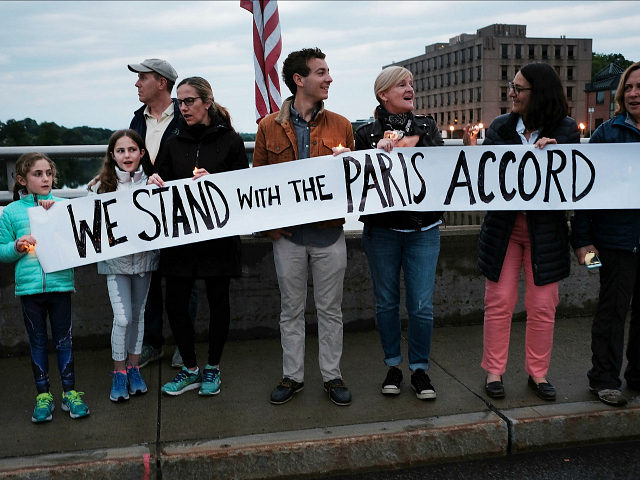As of Monday, 183 presidents of colleges and universities across the country have signed onto a pledge to meet the goals of the Paris Climate Agreement, even though President Donald Trump has announced the U.S.’s withdrawal.
The school leaders have joined business and governmental leaders in a pledge to “fill a leadership void on a global issue,” reports the Chronicle of Higher Education. “These are institutions, by and large, that have already committed to reduce their carbon footprint.”
The coalition was organized by former New York City mayor, Michael Bloomberg, and is working with the U.N. on how to represent the United States as a member of the Paris Climate Agreement, reports the New York Times.
“By declaring that ‘we are still in,’ the signatories are putting the best interests of their constituents, customers, students and communities first while assuring the rest of the world that American leadership on climate change extends well beyond the federal government,” according to a press release coordinated by various supporters of environmental causes.
Though, as James Pinkerton observed at Breitbart News, the Paris climate deal “had been signed by President Obama in 2015 but never submitted to the Senate for ratification,” the business, government, and school leaders state in their pledge, “We are still in.”
The leaders assert the federal government’s role in the climate agreement is, essentially, unnecessary:
In the U.S., it is local and state governments, along with businesses, that are primarily responsible for the dramatic decrease in greenhouse gas emissions in recent years. Actions by each group will multiply and accelerate in the years ahead, no matter what policies Washington may adopt.
In the absence of leadership from Washington, states, cities, colleges and universities and businesses representing a sizeable percentage of the U.S. economy will pursue ambitious climate goals, working together to take forceful action and to ensure that the U.S. remains a global leader in reducing emissions.
Robert C. Orr, dean of the University of Maryland’s School of Public Policy, helped draft the Paris agreement.
“A lot of universities have been walking the walk,” Orr said, reports the Chronicle. “Many universities, like my own, are small cities. The idea that academic institutions have to live their values on something as fundamental as sustainability has led to major investments in sustainable practices.”
“Participating in things like this do bring the network of universities closer into the coordination of the efforts to advance climate action,” he added. “They’re at the table, to use the phrase of the day, even if the United States government is not.”
“To my knowledge we haven’t seen a shared statement of such strong alignment at the senior level,” said Timothy Carter, president of Second Nature, a nonprofit group that works with colleges and universities on climate-change efforts.
Second Nature’s corporate sponsors include Customer First Renewables, Greener U, NextEra Energy Resources, and Siemens.
Groups that helped to coordinate the press statement include the American Sustainable Business Council, B Team, Bloomberg Philanthropies, Center for American Progress, Ceres, CDP, Climate Mayors, Climate Nexus, C40, C2ES, Environmental Defense Fund, Environmental Entrepreneurs, Georgetown Climate Center, ICLEI, National League of Cities, Rocky Mountain Institute, Second Nature, Sierra Club, The Climate Group, We Mean Business, and World Wildlife Fund.
Michael S. Roth, president of Wesleyan University, dismisses the notion that the coalition’s intention to continue with the goals of the Paris Climate Agreement is political in nature.
“I think it’s quite extraordinary that supporting a basic commitment to lessen a source of pollution in the world is seen as a particularly strong civic or political act,” Roth said, according to the Chronicle. “At a time when the White House is promoting an anti-scientific assault on public policy and research, it’s really important for universities and especially university leadership to defend the values that are necessary for us to be institutions of learning.”
“The university stands for the pursuit of knowledge and scientific inquiry,” said Brandeis President Ronald D. Liebowitz. “I see it as a responsibility. We recognize the science.”
Steven Knapp, president of George Washington University, even suggested public-private partnerships could be what keeps the climate agreement afloat in the absence of the federal government’s participation.
“Partnerships between businesses and institutions and governments can actually make a difference in combating climate change,” he said.
Meanwhile, Trump’s announcement also has supporters of the Paris agreement concerned about its effects on K-12 education.
Liana Loewus writes at Education Week that since “97 percent of climate scientists agree that global warming is due in large part to human activity,” Trump’s exit from the agreement will cause some difficulties for teachers in K-12 classrooms.
Loewus reports that Glenn Branch, deputy director of the National Center for Science Education, says Trump’s decision to withdraw from the climate agreement will not lead to changes for teachers who are already teaching that climate change is caused by humans.
“It will spur them to continue presenting climate change accurately, honestly, and constantly in the classroom,” Branch said, but added his concerns about other teachers.
“What I’m more worried about is teachers who reject the science and feel the need to share that with students—they may feel emboldened,” he explained. “And teachers in the middle who aren’t confident about the science, they’ll increasingly feel beleaguered and will feel pressure from the community, or will anticipate feeling pressure, and will water down their presentation of climate change.”

COMMENTS
Please let us know if you're having issues with commenting.